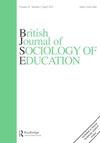投诉!
IF 2.1
3区 教育学
Q1 EDUCATION & EDUCATIONAL RESEARCH
引用次数: 0
摘要
投诉听起来可能是一件微不足道的事情,正如萨拉·艾哈迈德告诉我们的那样,当投诉在大学里提出时,他们通常会被这样对待。他们被当作呻吟和抱怨而置之不理,这种行为经常被归咎于女性、黑人或少数民族以及LGBTQ,从而边缘化并最终使历史上和当代被沉默的群体沉默。然而,大多数大学都有程序和流程,教职员工和学生可以通过这些程序和流程投诉,尤其是在英国,以满足《平等法案》(Equality Act)的要求。在这本极具原创性、引人入胜的书中,萨拉·艾哈迈德(Sara Ahmed)法医般的揭示了在大学系统中投诉并不是看上去那么简单;正如她在书的第一句话中所说:“被听到抱怨就是不被听到。”众所周知,自从被广泛报道后,萨拉·艾哈迈德辞去了她的大学,实际上是学术界的职务,因为她所在的机构未能对学生们关于性骚扰的投诉作出令人满意的回应。艾哈迈德自己也曾试图支持学生,但收效甚微。她在书中解释说,她决定在辞职前进行一项关于投诉的研究,并在辞职后暂停了一段时间后继续研究。这本书是一本关于制度过程、控制和再生产的民族志。它也是通过投诉过程的经验,对机构内的种族主义、性别歧视、同性恋恐惧症和残疾歧视进行讯问。萨拉·艾哈迈德(Sara Ahmed)通过对40名学生、学者、研究人员和管理人员进行叙述性采访,收集了她所描述的证词,这些人都以某种方式参与了正式的投诉程序,投诉“不平等或不公正的工作条件或滥用权力,如骚扰和欺凌”。大多数参与者通过艾哈迈德的网站或博客与她联系。对投诉问题的回应是压倒性的,这表明了问题的严重程度,也表明了人们希望有人倾听并给予一些承认和认可。萨拉·艾哈迈德是一位著名的女权主义者,正如她所说,她已经成为她所在机构的女权主义者;现在,她能够成为其他机构之外的女权主义者的耳朵。这本书也代表了女权主义者的观点。正如艾哈迈德所说,投诉是女权主义教学法的一种形式,因为投诉是为了反对虐待、骚扰、歧视和不公平的制度,这种制度经常针对女性,也针对“有色人种”、残疾人和LGBTQ群体。它是一种揭示制度本质及其运作方式的手段——它们如何频繁地自我复制、自我强化,从而抵制变革。萨拉·艾哈迈德是一名女权主义者,她通过辞职表明了她为正义而战的决心,以及她的自主地位,她唤起了参与者强烈的信任感,因为他们觉得自己和自己的故事本文章由计算机程序翻译,如有差异,请以英文原文为准。
Complaint!
Making a complaint may sound like something fairly trivial and as Sara Ahmed tells us when complaints are lodged in the university they are often treated as such. They are brushed aside as moans and whinges and such behaviour is frequently ascribed to women, Black or Minority Ethnic people and LGBTQ, thus marginalising and ultimately silencing groups of people who have historically and contemporaneously been silenced. And yet most universities have procedures and processes through which staff and students can complain, not least as in Britain, in order to meet the Equality Act, for example. In this highly original and engaging book Sara Ahmed forensically reveals that making a complaint in the university system is not what it might seem to be; as she says in her opening sentence ‘To be heard complaining is not to be heard’. (1). As is well known, since it was widely reported, Sara Ahmed resigned from her university and indeed academia, because of the failure of her institution to respond satisfactorily to complaints made by students about sexual harassment. Ahmed had herself tried to support the students but to little avail. She explains in the book that she decided to undertake the research into making a complaint before she resigned and continued it, after a pause, after her resignation. The book is an ethnography of institutional process, control and reproduction. It is also an interrogation of racism, sexism, homophobia and ableism within the institution through the experiences of the complaint process. Sara Ahmed gathered the testimonies, as she describes them, through narrative interviews with 40 students, academics, researchers and administrators who had been involved in some way in a formal complaint process, about ‘unequal or unjust working conditions or abuses of power such as harassment and bullying’. (9). Most of the participants contacted Ahmed through her website or blog. The response to the complaints issue was overwhelming which is indicative of the extent of the problem and also the desire for someone to listen and give some acknowledgement and thus validation. Sara Ahmed is a well-known feminist and as she says she had become a feminist ear for her institution; now she was able to become a feminist ear for those outside in other institutions. This book also represents a feminist ear. Complaint, as Ahmed says, is a form of feminist pedagogy in that making a complaint is to speak out against abuse, harassment, discrimination and an unfair system frequently against women but also ‘people of colour’, disabled people and LGBTQ. It is a means of exposing the nature of institutions and how they work – how they work frequently to reproduce themselves, and reinforce themselves, thus resisting change. As a feminist ear and someone who had demonstrated her commitment to fighting for justice, as well as her autonomous position by resigning, Sara Ahmed evoked a strong sense of trust from the participants in that they felt they and their stories
求助全文
通过发布文献求助,成功后即可免费获取论文全文。
去求助
来源期刊
CiteScore
3.70
自引率
9.50%
发文量
74
期刊介绍:
British Journal of Sociology of Education is one of the most renowned international scholarly journals in the field. The journal publishes high quality original, theoretically informed analyses of the relationship between education and society, and has an outstanding record of addressing major global debates about the social significance and impact of educational policy, provision, processes and practice in many countries around the world. The journal engages with a diverse range of contemporary and emergent social theories along with a wide range of methodological approaches. Articles investigate the discursive politics of education, social stratification and mobility, the social dimensions of all aspects of pedagogy and the curriculum, and the experiences of all those involved, from the most privileged to the most disadvantaged. The vitality of the journal is sustained by its commitment to offer independent, critical evaluations of the ways in which education interfaces with local, national, regional and global developments, contexts and agendas in all phases of formal and informal education. Contributions are expected to take into account the wide international readership of British Journal of Sociology of Education, and exhibit knowledge of previously published articles in the field. Submissions should be well located within sociological theory, and should not only be rigorous and reflexive methodologically, but also offer original insights to educational problems and or perspectives.

 求助内容:
求助内容: 应助结果提醒方式:
应助结果提醒方式:


